
The Information Law Institute will held the Multidisciplinary Graduate Student Symposium: Identity and Identification in a Networked World, September 29-30, 2006, New York University School of Law .
Increasingly, who we are is represented by key bits of information scattered throughout the data-intensive, networked world. Online and off, these core identifiers mediate our sense of self, social interactions, movements through space, and access to goods and services. There is much at stake in designing systems of identification and identity management, deciding who or what will be in control of them, and building in adequate protection for our bits of identity permeating the network.
This symposium will examine critical and controversial issues surrounding socio-technical systems of identity, identifiability and identification. It will showcase emerging scholarship of graduate students at the cutting edge of humanities, social sciences, artists, systems design & engineering, philosophy, law, and policy to work towards a clearer understanding of these complex problems, and build foundations for future collaborative work.
In addition to graduate student panels, keynote talks will be delivered by Professor Ian Kerr, Canada Research Chair in Ethics, Law & Technology at the University of Ottawa, and Dick Hardt, CEO and founder of Sxip Identity.
Text Source: Information Law Institute website
 Photo by Xacobe de Toro
Photo by Xacobe de Toro




